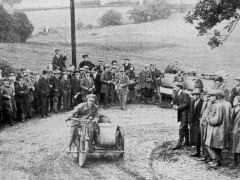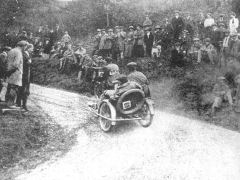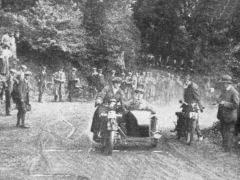|

 By John Walter By John Walter
The original Levis Cup Trial was first held on 4th October 1913. The premier award for this classic event was the magnificent cup donated by Butterfields Ltd., the makers of Levis Motorcycles. The road trial was organised by the Sutton Coldfield and Mid Warwickshire Auto Club and started close to the main Post Office in Birmingham City Centre. It ran to Ludlow and back, a distance of approximately 100 miles and included some stiff hill climbs and the very unusual flexibility test. The first trial was won by Leslie Guy riding a Scott. A Gold Medal was awarded to Geoff Davison on a two speed Sunbeam. With the outbreak of the first World War the event lapsed until 1919 when it was won by Albert Milner on a Levis. Soon after this the event lapsed again and the Levis Cup became the trophy for the best performance on a single speed machine in the Colmore Cup Trial. This was also organised by the Sutton Coldfield Club, by then known as SUNBAC.
In 1921 Geoff Davison won the trophy and then went on to win the event in 1922 and 1923. All three occasions on a Levis. Having won three times in a row the Levis Cup became his personal property. Geoff Davison had a very distinguished Motor Cycling and journalistic career. He was a TT rider, trials rider, editor, author, reporter. He was founder and editor of the TT Special from 1927 to 1965 and was also editor and publisher of the VMCC Journal. Those that knew Geoff remember him as a dignified gentleman with a lovely sense of humour. He dressed conservatively and when he rode he wore long golfing type stockings, a '20's style pullover and a flat cap! A gentleman of the old school! In 1954 Geoff joined the then eight year old Vintage Motor Cycle Club and presented the club with the Levis Cup to be the premier award for a major road trial. This was the beginning of VMCC Levis Cup Trial and was to follow the original as closely as possible. We are indebted to the late Ivor Mutton, one of the founders of the Banbury Run and F. R. Oliver for the revival of the Levis Cup on the 26th September, 1954. The first VMCC Levis Cup Trial was held on the 26th September 1954 and was won by F. V. Chambers riding a1929 Scott. To keep the single gear tradition Butterfields presented a tankard for the best performance on such a machine. This went to John Moore riding a single speed 1920 Norton.
 The original start at Birmingham was considered impractical and was changed to the Red Lion at Holt Heath. The route was still 100 miles and there was a lunch stop at Ludlow. The main hills and the flexibility test were retained. The trial continued for a number of years at Holt Heath but then moved down the road to Hallow. The Wheeler family were very active in the running of the event here with the emphasis on overnight camping and a Saturday evening barbecue. The support for this type of activity waned, despite the great efforts of John Pilkington and later Ken and Margaret Norton. It was then felt that a venue with better facilities should be found, so in 1987 the base was moved to the Wharf at Holt Fleet and remained there until 1996. In 1997 the Levis Cup moved to a new venue. It is about a mile up the road from Holt Fleet at The Lenchford Hotel at Shrawley, Worcestershire. This is about 6 miles north of Worcester on the B4196 just off the A443. It is a lovely river side site, with hard standing for the competitors and ample separated car parking for the competitor's cars and trailers. The original start at Birmingham was considered impractical and was changed to the Red Lion at Holt Heath. The route was still 100 miles and there was a lunch stop at Ludlow. The main hills and the flexibility test were retained. The trial continued for a number of years at Holt Heath but then moved down the road to Hallow. The Wheeler family were very active in the running of the event here with the emphasis on overnight camping and a Saturday evening barbecue. The support for this type of activity waned, despite the great efforts of John Pilkington and later Ken and Margaret Norton. It was then felt that a venue with better facilities should be found, so in 1987 the base was moved to the Wharf at Holt Fleet and remained there until 1996. In 1997 the Levis Cup moved to a new venue. It is about a mile up the road from Holt Fleet at The Lenchford Hotel at Shrawley, Worcestershire. This is about 6 miles north of Worcester on the B4196 just off the A443. It is a lovely river side site, with hard standing for the competitors and ample separated car parking for the competitor's cars and trailers.
The Levis Cup Trial is the oldest road trial in the vintage calendar and is one of the few really competitive events. The organisers have always kept the event as near to the original format as possible but some changes have been made over the years. There are 15 trophies and the event is restricted to machines manufactured before 1946. One of the trophies is the Sgt. Colley trophy, presented by Norman Best, contributor to the VMCC Journal and Cotton rider, in memory of his uncle Sergeant Harold John Colley, V.C., M.M. Harold Colley was a very remarkable man and a true hero of the first World War. He was born on the 26th May 1895 and joined the Duke of Cornwall's Light Infantry in September 1914. He was a keen cyclist and passed out as a DR and went to France in March, 1915. Private Colley saw action in most of the major battles of the Western front and received serious wounds early in 1917 when rescuing some comrades who had been buried by a mortar bomb. After recovering he returned to France, was promoted to Lance Corporal and was awarded the Military Medal. In June 1918 he was promoted to full sergeant on the battlefield and was awarded the Certificate of Meritorious Service. It is said that this is the only Certificate of Meritorious Service awarded in France. On August 25th, 1918, at Martinpuich, the enemy launched a very strong counter attack and Sergeant Colley's company was overrun. Rallying his men, Colley with but three men left alive and unwounded, held the position. Sergeant Colley and his men's brave action prevented the enemy breakthrough, but sadly the heroic Harold suffered very severe wounds and died the same day. He was posthumously awarded the highest of all decorations, the Victoria Cross.
 The event is run over beautiful Worcestershire and Shropshire countryside with the choice of an average target speed of 18, 20 or 24 miles per hour. This average must be maintained over each section and not just overall. This is monitored by regular time checks at various intervals, where cards are marked by marshals. There are several hill sections which include the long and beautiful Ankerdine and the very steep Flagstaff Hill. After a relaxing stop for lunch in Ludlow, the afternoon run starts at the bottom of Whitbach Hill for the Flexibility Test. The competitor has to select a gear and this has to be kept for the duration of the climb. This is divided into two parts. The first has to be traversed as slowly as possible and then, on crossing a line the remainder is to be covered as quickly as possible. During the slow section a steady line must be maintained, there must be no slipping of the clutch and the feet must not ground. The slow time is divided by the quickest time and this produces a ratio. This figure is used in the event of a tie in any of the categories and there is a separate award for this part of the road trial. The scoring for the Levis Cup Road Trial is as follows. Bonus points are awarded for: age of machine, number of gears, no clutch, belt drive and small capacity. Penalty points are added for lateness or early arrival at any of the time checks. The event is run over beautiful Worcestershire and Shropshire countryside with the choice of an average target speed of 18, 20 or 24 miles per hour. This average must be maintained over each section and not just overall. This is monitored by regular time checks at various intervals, where cards are marked by marshals. There are several hill sections which include the long and beautiful Ankerdine and the very steep Flagstaff Hill. After a relaxing stop for lunch in Ludlow, the afternoon run starts at the bottom of Whitbach Hill for the Flexibility Test. The competitor has to select a gear and this has to be kept for the duration of the climb. This is divided into two parts. The first has to be traversed as slowly as possible and then, on crossing a line the remainder is to be covered as quickly as possible. During the slow section a steady line must be maintained, there must be no slipping of the clutch and the feet must not ground. The slow time is divided by the quickest time and this produces a ratio. This figure is used in the event of a tie in any of the categories and there is a separate award for this part of the road trial. The scoring for the Levis Cup Road Trial is as follows. Bonus points are awarded for: age of machine, number of gears, no clutch, belt drive and small capacity. Penalty points are added for lateness or early arrival at any of the time checks.
|